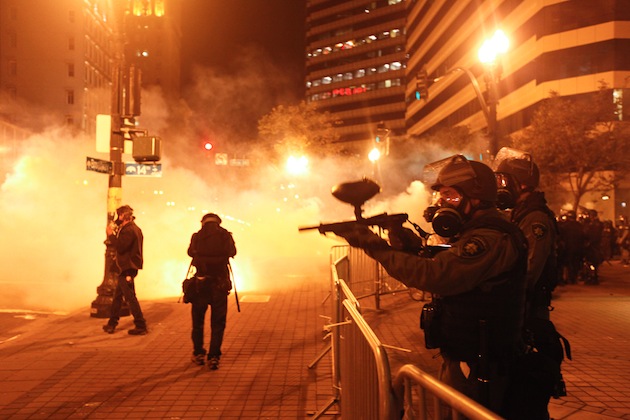Eric Holder finally got one right.
'It is settled law that citizens have the right to record police.'
Journalist Mannie Garcia was arrested for filming police as they detained two men in Maryland. Garcia was charged with disorderly conduct, but the Justice Department has confirmed that he was within his rights to film the cops. Robert Corn-Revere, Garcia's lawyer, discusses the case and DOJ's statement.
---
Read the opinion filed by the Justice Department...
The U.S. Justice Department says it is now “settled law” that anyone is allowed to record or photograph police officers in public. A statement of interest – a legal term for when an agency or organization has a stake in the outcome of a trial, but not direct involvement – filed by the Justice Department this week in the case of Mannie Garcia v. Montgomery County, Md., upholds the right of individuals to photograph police under the First, Fourth and Fourteenth Amendments to the U.S. Constitution.
Garcia was no amateur with a camera – he had White House press credentials, which perhaps explains why the Justice Department has spoken up on this specific case now before a district judge in Maryland.
The complaint states that police placed dragged Garcia to the police car, put him in handcuffs, threw him to the ground by kicking his feet out from under him, taunted him, threatened to arrest his wife if she came too close and took his camera, and seized the memory card, which was never returned. The result was a disorderly conduct charge, for which he was acquitted, but before he went to trial Garcia temporarily lost his White House press credentials due to the charges. After his acquittal, Garcia went on to seek damages for the incident.
---
This is the better clip:
Local news report includes interview with photographer.
The National Press Photographers Association weighs in DOJ's statement:
The statement today is the Justice Department’s way of telling the court that they have an interest in seeing Garcia’s civil rights case move forward and that they uphold his constitutional rights. It’s also only the second time Justice has issued such a statement in support of photographing and reporting on police as they perform their job in public.
Courts have viewed and should view discretionary charges brought against individuals engaged in protected speech with considerable skepticism.
The complaint states that police placed dragged Garcia to the police car, put him in handcuffs, threw him to the ground by kicking his feet out from under him, taunted him, threatened to arrest his wife if she came too close and took his camera.
In the statement filed this week in a federal court in Maryland, the Justice Department argues that not only do individuals have a First Amendment right to record officers publicly doing their duties, they also have Fourth and 14th Amendment rights protecting them from having those recordings seized without a warrant or due process.
The DOJ urges the court to uphold these rights and to reject a motion to dismiss from Montgomery Co. in Garcia v. Montgomery Co., a case that has implications for an increasing crop of litigation on the subject in the era of ubiquitous smartphones.
“The United States is concerned that discretionary charges, such as disorderly conduct, loitering, disturbing the peace and resisting arrest, are all too easily used to curtail expressive conduct or retaliate against individuals for exercising their First Amendment rights. … Core First Amendment conduct, such as recording a police officer performing duties on a public street, cannot be the sole basis for such charges,” wrote the DOJ Civil Rights Division.
The Justice Department, echoing its position in another recent case, Sharp v. Baltimore City Police Dept., et al., filed January 2012, urges the court to affirm individuals’ right to record police.
“Both the location of Mr. Garcia’s photography, a public street, and the content of his photography, speech alleging government misconduct, lie at the center of the First Amendment,” the DOJ wrote.
Justice’s filing touches on a trend of cases nationwide. As personal recording equipment becomes more common in the era of smartphones and tablets, police-recording cases have cropped up around the country.
In Illinois, the American Civil Liberties Union recently won a challenge to a state law banning recording individuals without both parties’ consent, with a federal judge issuing a permanent ban on enforcing the law in regards to publicly recording officers after the Supreme Court declined to hear a challenge in the case.
In Washington, D.C., the police department last summer issued an order that its officers not interfere with people recording their public duties, echoing a similar memo issued by the city of Philadelphia, where another lawsuit has been filed challenging the arrest of a man who recorded police with his cellphone.
Federal appellate courts have upheld a First Amendment right to record police in cases including Glik v. Cunniffe in 2011, Smith v. Cummings in 2000 and Fordyce v. City of Seattle in 1995, all of which Justice cites in its statement in the Garcia case.
Further reading:
Read the opinion filed by the Justice Department...
Illinois Law Criminalizing the Recording of Police Activity Comes to an End after 51 Years
Why Are Americans Arrested for Videotaping Police in Public Places?
Photo - Police fire on protesters at Occupy Oakland.
